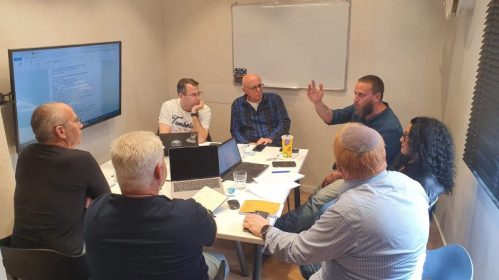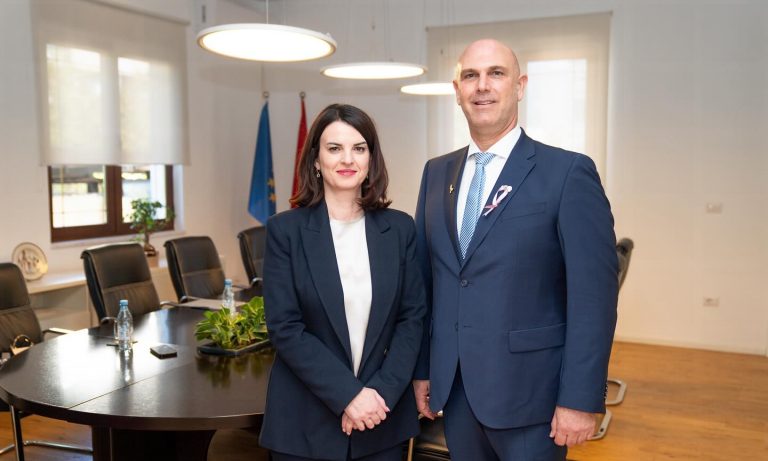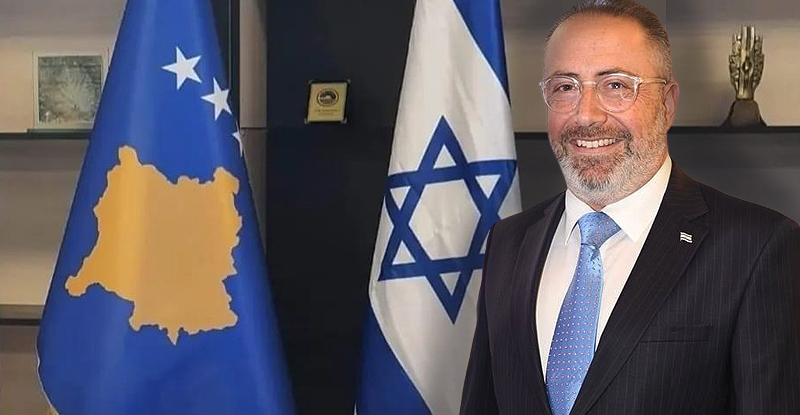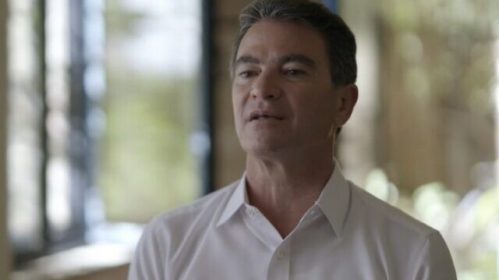The history of the Jews in Albania dates back about 2,000 years. According to historian Apostol Kotani (Albania and the Jews):[1] “Jews may have first arrived in Albania as early as 70 C.E. as captives on Roman ships that washed up on the country’s southern shores…descendants of these captives that would build the first synagogue in the southern port city of Sarandë in the fifth century…[but] Little is known about the Jewish community in the area until the 15th century.”[2][3]
Present-day Albanian Jews, predominantly of Romaniote[4] and Sephardi origin, have in modern times only constituted a very small percentage of the population; during World War II, Albania was the only Nazi-occupied country in Europe to see an increase in its Jewish population. During the communist dictatorship of Enver Hoxha, the Socialist People’s Republic of Albania banned all religions, including Judaism, in adherence to the doctrine of state atheism. In the post-communist era, these policies have been abandoned and the freedom of religion is permitted, although the number of practicing Jews in Albania is today very small, with many Jews having made aliyah to Israel.
In World War II, no Albanian Jews were turned over to the Germans. After the Italian and German occupation of Albania, the Jewish population actually increased thanks to an Albanian set of laws known as Besa from the Kanun.
Contents
1 Modern roots
2 1900–1939
3 World War II
4 Communist era
5 Present Jews in Albania
6 Notable Jews of Albanian Origin
7 References
8 External links
Modern roots
First reports of Jews living in Albania date from the 70 CE. By the early 16th century, there were Jewish settlements in most of major cities of Albania such as Berat, Elbasan, Vlorë, Durrës and also they are reported as well in Kosovo region. These Jewish families were mainly of Sephardic origin and descendants of the Spanish and Portuguese Jews expelled from Iberia in the end of 15th century CE. In 1520 in Vlorë were reported 609 Jewish households and also Vlorë was also the site of Albania’s only synagogue which was destroyed in the First World War. In 1673 the charismatic Jewish prophet Sabbatai Zevi was exiled by the sultan to the Albanian port of Ulqin, also called Ulcinj, now in Montenegro, dying there three years later.[5]
1900–1939
According to the Albanian census of 1930, there were only 204 Jews registered at that time in Albania. The official recognition of the Jewish community was granted on April 2, 1937, while at that time this community consisted in about 300 members. With the rise of Nazi Germany a number of German and Austrian Jews took refuge in Albania. Still in 1938 the Albanian Embassy in Berlin continued to issue visas to Jews, at a time when no other European country was willing to take them.[5] One of the major Albanologists Norbert Jokl asked for Albanian citizenship, which was granted to him immediately; but this could not save him from concentration camps.
World War II
Main article: The Holocaust in Albania
Albania had about 200 Jews at the beginning of the war.[6] It subsequently became a safe haven for several hundred Jewish refugees from other countries.[7][8] At the Wannsee Conference in 1942, Adolf Eichmann, planner of the mass murder of Jews across Europe, estimated the number of Jews in Albania that were to be killed at 200.[9] Nevertheless, Jews in Albania remained protected by the local Christian and Muslim[10] population and this protection continued even after the occupation of Albania by Nazi forces after the capitulation of Italy on September 8, 1943. At the end of the war, Albania had a population of 2,000 Jews.[11][12]
Communist era
The Prime Minister of Albania Sali Berisha meeting with Rabbin Yoel Kaplan in Tirana
Throughout Albania’s communist rule under the dictatorship of Enver Hoxha, the Jewish community was isolated from the Jewish world, though this does not reflect anti-Jewish measures. In order to forge sustainable national unity as well as the new socialism, Hoxha banned confessional loyalties across the religious spectrum. In this manner, the fate of the Jewish community was inextricably linked to the fate of Albanian society as a whole.
Ruins of the ancient synagoge found in Saranda
All religion was strictly banned from the country. After the fall of Communism in 1991, nearly all the Jews of Albania emigrated. They left primarily for economic reasons and not because of anti-Semitism. Some 298 Albanian Jews immigrated to Israel (mostly settling in Ashdod and Karmiel) and about 30 others moved to the United States. About a dozen Jews, most of whom were married to non-Jews, chose to remain in Albania.[13]
Present Jews in Albania
Today, there are around 40 to 50 Jews living in Albania, most in the capital,[14] Tirana. An old synagogue was discovered in the city of Saranda[15][16] and a new synagogue known as “Hechal Shlomo” started providing services for the Jewish community in Tirana in December 2010. A synagogue remains in Vlorë, but is no longer in use. Also in December 2010, Rabbi Joel Kaplan was inaugurated as the first chief rabbi of Albania by the Prime Minister Sali Berisha and Chief Rabbi of Israel Shlomo Amar. A Jewish Community Centre named “Moshe Rabbenu” was also inaugurated in Tirana,[17] in total disaccordance with the Jewish community who denies Kaplan’s status of chief rabbi.[18]



















